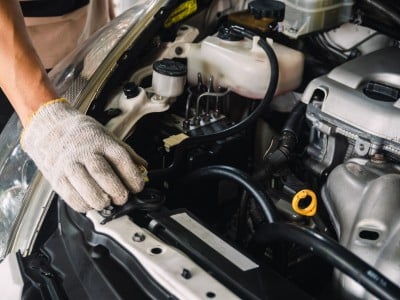Car Maintenance 101: How to Extend Your Vehicle's Lifespan

Are you looking to get the most out of your vehicle? Regular car maintenance is the key to extending your vehicle's lifespan and ensuring optimal performance. In this article, we will explore the importance of regular car maintenance and the benefits of extending your vehicle's lifespan.
We will provide you with a step-by-step guide on checking and maintaining proper fluid levels, inspecting and replacing filters, tire maintenance and rotation, and keeping up with routine maintenance tasks. By following these tips and prioritizing regular maintenance, you can save money, avoid breakdowns, and enjoy the long-term benefits of taking care of your car. So, let's dive in and learn how to extend your vehicle's lifespan through proper car maintenance.
The Importance of Regular Maintenance
Before we delve into the specifics of car maintenance, let's discuss why it's so crucial. Regular maintenance is like preventive medicine for your vehicle. It helps you catch and address issues early on, preventing them from turning into major headaches and expensive repairs. Here's why you should care:
1. Safety First
A well-maintained car is a safer car. Regular maintenance ensures your brakes, tires, lights, and other safety features are in top working condition, reducing the risk of accidents.
2. Save Money
A stitch in time saves nine. Addressing minor issues during routine maintenance is far cheaper than waiting until they become major problems.
3. Extend Lifespan
Just as we need regular check-ups to stay healthy, your car needs them to stay on the road longer. Proper care can significantly extend your vehicle's lifespan.
4. Fuel Efficiency
A well-maintained engine runs more efficiently, which means better gas mileage. You'll save money at the pump and reduce your carbon footprint.
DIY vs. Professional Maintenance
One of the first decisions you'll face is whether to perform maintenance tasks yourself or take your car to a professional mechanic. Both options have their merits:
DIY Maintenance
- Pros: Saves money on labor costs, builds mechanical knowledge, and allows you to develop a closer relationship with your vehicle.
- Cons: Requires time, tools, and expertise. Some tasks are best left to professionals.
Professional Maintenance
- Pros: Experienced mechanics can quickly diagnose and fix issues, often providing warranties for their work. They have access to specialized equipment.
- Cons: Costs more due to labor charges, but can save you time and frustration.
Ultimately, your choice depends on your skill level, available time, and the complexity of the task at hand.
Essential Maintenance Tasks
Now that you understand the importance of regular car maintenance and have considered whether to go DIY or seek professional help, let's dive into some essential tasks you should perform regularly:
1. Oil Changes
Regular oil changes are the lifeblood of your engine. Follow your vehicle's recommended schedule to make sure proper lubrication and prevent engine damage.
2. Tire Care
Check tire pressure, rotate tires, and inspect for wear regularly. Properly inflated and aligned tires improve fuel efficiency and safety.
3. Brake Inspection
Squeaky brakes? Don't ignore them. Brake pads, rotors, and fluid should be checked and replaced as needed.
4. Fluid Levels
Regularly check and top up engine oil, coolant, transmission fluid, and brake fluid. Low levels can lead to engine damage or brake failure.
5. Air Filters
Dirty air filters restrict airflow, reducing engine efficiency. Replace them according to your car's maintenance schedule.
6. Battery Care
Clean battery terminals, check for corrosion, and ensure your battery is securely fastened. A dead battery can leave you stranded.
Seasonal Maintenance
Different seasons bring different challenges for your vehicle. Here are some seasonal maintenance tips:
1. Winter
Check your antifreeze, replace wiper blades, and inspect your heater and defroster.
2. Spring
Clean salt and grime from the undercarriage, check your A/C system, and inspect your cooling system.
3. Summer
Test your battery, inspect hoses and belts for signs of wear, and check your tires for proper inflation.
4. Fall
Replace your cabin air filter, inspect the heating system, and ensure your lights are working correctly.
Maintenance Schedule and Record-Keeping
Keeping track of your vehicle's maintenance can seem like a daunting task, but it's an essential part of extending its lifespan. Here's why it's important and how to do it effectively.
1. The Importance of a Maintenance Schedule
Having a regular maintenance schedule ensures that you don't overlook any critical tasks. It serves as a reminder for when your car needs an oil change, tire rotation, or brake system check. Following the manufacturer's recommended maintenance schedule is key to keeping your vehicle in top condition.
2. Keeping Detailed Records
Detailed records of every maintenance task provide a clear picture of your car's health. These records should include the date of the maintenance, the mileage at the time, and details about what was done. If parts were replaced, note this down, too.
3. Benefits of Record-Keeping
Maintaining detailed records has several benefits. First, it helps you keep track of what has been done and what needs to be done next. Second, it provides valuable information if you ever need to sell your car. Potential buyers are likely to pay more for a vehicle with a well-documented maintenance history since it proves that the car has been well taken care of.
When to Call a Professional
While some maintenance tasks are suitable for DIY enthusiasts, certain issues require the expertise of a professional mechanic. Don't hesitate to seek professional help if you encounter:
1. Strange Noises
Unusual sounds like grinding, squealing, or knocking could indicate serious problems with your car's components.
2. Check Engine Light
When your vehicle's computer system detects a problem, the check engine light illuminates. Professional diagnostic equipment is needed to pinpoint the issue.
3. Major Repairs
Tasks like transmission and engine repairs should be left to experienced mechanics due to their complexity.
The Road to a Longer Car Lifespan Starts Here
Taking care of your car isn't just about keeping it running smoothly; it's about ensuring your safety, saving money, and enjoying the open road with confidence. By following the essential maintenance tips and guidelines provided in this guide, you can extend your vehicle's lifespan and make the most of your investment. So, start your journey towards a longer, healthier life for your car today. Safe travels!











